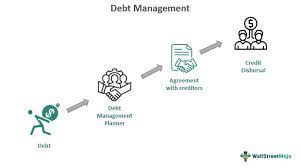
Debt management is the process of organizing and managing your debt in a way that minimizes your payments and interest charges, and helps you get out of debt faster. There are a number of different debt management strategies, but they all involve the same basic steps:
- Get a clear picture of your debt. This includes knowing how much debt you owe, to whom you owe it, and what your interest rates are.
- Create a budget. This will help you track your income and expenses, and make sure you have enough money to cover your monthly payments.
- Make a plan to pay off your debt. This may involve consolidating your debt into one loan, or making higher monthly payments.
- Stick to your plan. This is the most important step! It can be difficult to stay motivated, but it’s important to remember that you’re working towards a goal.
Debt management strategies
There are a number of different debt management strategies, each with its own pros and cons. Some of the most common strategies include:
- Debt consolidation: This involves taking out a new loan to pay off your existing debts. This can help you save money on interest, and make it easier to manage your payments. However, it’s important to make sure you can afford the monthly payments on the new loan.
- Debt settlement: This involves negotiating with your creditors to reduce the amount of debt you owe. This can save you a significant amount of money, but it can also damage your credit score.
- Debt management plans: These are plans that are set up by nonprofit credit counseling agencies. These agencies will negotiate with your creditors on your behalf to lower your interest rates and monthly payments. You will then make a single monthly payment to the credit counseling agency, who will then distribute the money to your creditors. Debt management plans can be a good option for people who are struggling to make their monthly payments, but they can also take several years to complete.
The importance of debt management
Debt can be a major financial burden, and it can have a negative impact on your credit score, your ability to get approved for loans, and your overall financial health. If you’re struggling with debt, it’s important to take steps to get your finances under control. Debt management can help you save money, reduce your stress, and get on the road to financial freedom.
Getting started with debt management
If you’re ready to start managing your debt, there are a few things you need to do. First, you need to get a clear picture of your debt. This includes knowing how much debt you owe, to whom you owe it, and what your interest rates are. You can get this information by reviewing your credit report, or by contacting your creditors directly.
Once you know how much debt you have, you need to create a budget. This will help you track your income and expenses, and make sure you have enough money to cover your monthly payments. There are a number of different budgeting tools and resources available online and in libraries.
Once you have a budget, you can start to make a plan to pay off your debt. This may involve consolidating your debt into one loan, or making higher monthly payments. You may also want to consider working with a nonprofit credit counseling agency to create a debt management plan.
Debt management can be a challenge, but it’s important to remember that you’re not alone. There are a number of resources available to help you get started, and there are many people who have successfully managed their debt and achieved financial freedom.
Tips for successful debt management
Here are a few tips for successful debt management:
- Be realistic. Don’t try to do too much too soon. Make small changes that you can stick to, and gradually increase your progress over time.
- Get help. If you’re struggling to manage your debt on your own, consider working with a nonprofit credit counseling agency. These agencies can provide you with free or low-cost counseling and help you create a debt management plan.
- Stay motivated. It’s important to stay motivated when you’re trying to pay off debt. Remember why you’re doing this, and focus on your goals.
Debt management can be a challenge, but it’s possible to get out of debt and achieve financial freedom. With hard work and dedication, you can reach your goals and take control of your finances.
